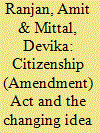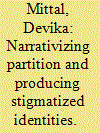| Srl | Item |
| 1 |
ID:
190314


|
|
|
|
|
| Summary/Abstract |
In 2019, the Indian parliament adopted the Citizenship (Amendment) Act, which grants citizenship to non-Muslims ‘persecuted’ minorities such as Hindus, Sikhs, Buddhists, Jains, Parsis or Christians from Afghanistan, Bangladesh and Pakistan. Protests were held against the CAA in various parts of India. For protestors, the CAA is contrary to the secular character of the Indian citizenship. Supporters of the CAA also held rallies enumerating its benefits. This paper traces the historical evolution of the constitutional debates and changes in the Indian citizenship rules, and examines the socio-political impact of the CAA.
|
|
|
|
|
|
|
|
|
|
|
|
|
|
|
|
| 2 |
ID:
186891


|
|
|
|
|
| Summary/Abstract |
The independence from the British rule was accompanied with partition of the Indian subcontinent on religious lines. Since partition in 1947, the two nation-states India and Pakistan have been hostile toward each other. Communalism has also been a major challenge in both these countries. The current study locates this continued hostility or the “enemy” narrative that the countries harbor not just of each other, but which also shapes the experience of a religious community within their territory. Limiting the inquiry to the Indian side, this paper explores the production of the “enemy” narrative through the discursive knowledge around partition and how it locates Muslims. The paper analyzes textbooks of two education boards in India and argues that the narrative excludes the contribution of Muslims in the nationalist movement, charts out an uncritical history of the demand for partition, and stigmatizes the Muslim community as “communal” and “unpatriotic.”
|
|
|
|
|
|
|
|
|
|
|
|
|
|
|
|